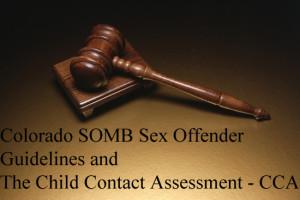Exclusively Practicing Only Colorado Criminal
Law - Defending Your Future

When bond is set in a Colorado sex crime case an order is entered as a condition of bond that prohibits the accused person from having contact with anyone under the age of 18 including their own children. This order can carry through sentencing if not handled properly.
This article addresses the source of the that no contact order how the order works and the way around it for offenders who request access to their own children under the Colorado Sex Offender Management Board’s Child Contact Assessment (CCA) provisions.
If a Colorado sex offender wants to have contact with their own children, the Colorado Sex Offender Management Board (SOMB) Child Contact Assessment CCA (previously the Parental Risk Assessment PRA) is used to assesses whether contact with his/her own children will be “allowed.”
Like many other so called “instruments” the CCA is intended to estimate the potential risk a convicted adult sex offender may pose to his or her own children. But there are immediate and automatic exclusions from ever obtaining a positive result. While there are times when it may be possible to perform the CCA PRIOR to a plea the therapeutic community strongly recommends waiting until AFTER a plea of guilty is entered as the CCA is not considered reliable until the conviction enters.
The CCA assessment upon completion determines the level and type of contact, if any, with the offender’s own child(ren)
The exclusion criteria, before the CCA can even be conducted are:
The offender does not meet any of the exclusionary criteria in (SOMB Standard) 5.725 (i.e., diagnosis of Pedophilia (DSMIV),
The offender has a score on the MCMI of > 85 for Antisocial Personality Disorder, Narcissistic, Paranoid, on the DSMIV),
The offender has been identified as having a mental abnormality on the Psychopathy Checklist, and a diagnosis of sexual sadism, or has ever committed an offenses against their own child/children;
A finding of Sexually Violent Predator (SVP) by a Colorado court, parole board or equivalency .
The offender does not have two or more pre-screen factors;
The offender wants contact with his/her own minor child as defined in under the age of eighteen (18);
The CCA itself is comprised of many of the same protocols used in the post-conviction sex-offense- specific evaluations , but it also involves additional assessment instruments and interviews that are designed to explore more fully a client’s sexual history, personality style, empathy and capacity for attachment.
The SOMB standard that applies to the CCA (SOMB 5.70 LINK ) is too long and complex to try to include in this article. A LINK is also provided to a pdf chart that graphically identifies the factors used by the CCA to either recommend approval or denial of the contact sought.
Estimated costs for the CCA evaluation ranges from $8001800 depending on the type of evaluation needed.
The type of SOMB assessments involved in a Child Care Assessment involve extensive psychological testings such as personality testing, sexual interest testing, the Abel Assessment and other assessments that allegedly measure empathy and attachment capacities, and interviews with the client.
In addition, a sexual history polygraph test will most likely be carried out. There are also interviews with the client’s spouse and mother or father of the children,( if that is a different person). The children are also interviewed.
Before The Community Safety Team(CST) will allow contact with the offender’s own children the following criteria are applied:
In a 2014 Audit of the SOMB program by the Colorado State Legislature to the Colorado Department of Public Safety engaged with the intent to improve the SOMB guidelines: With reference to the CCA the committee said that it might be “overly punitive” that an offender who has ever victimized any of his or her own children (regardless of their age and when the abuse occurred) is ineligible for the Child Contact Assessment process. Such a policy was too restrictive and that “more flexibility could be built into the system.”
They also found that the CCA process seemed excessively burdensome and costly and that in prison it was nearly impossible for the process to be completed in a timely way and that both processes be streamlined.
The Audit also found that “no credible research evidence to support the use of the Child Contact Assessment tool” and that “empirical validation of this tool should be carried out on a reasonable timescale and that [the CCA] be modified or replaced if necessary.
The Audit found that while the hope of seeing their children again is a powerful motive for offenders to reform, the kind of “disruption.. from being denied access to the child was harmful to that child” and that the “present process does not seem to properly balance these issues.”

About The Author: H. Michael Steinberg. A Denver Colorado Sex Crimes Criminal Defense Lawyer or call his office at 303-627-7777 during business hours or call his cell if you cannot wait and need his immediate assistance 720-220-2277.
If you are charged with A Colorado crime or you have questions about Colorado SOMB Sex Offender Guidelines and The Child Contact Assessment CCA, please call our office. The Law Offices of H. Michael Steinberg, in Denver, Colorado, provide criminal defense clients with effective, efficient, intelligent and strong legal advocacy. We can educate you and help you navigate the stressful and complex legal process related to your criminal defense issue.
H. Michael Steinberg, is a Denver, Colorado criminal defense lawyer with over 42 years of day to day courtroom experience specializing in Colorado Criminal Law along the Front Range. He will provide you with a free initial case consultation to evaluate your legal issues and to answer your questions with an honest assessment of your options. Remember, it costs NOTHING to discuss your case. Call now for an immediate free phone consultation.
Contact A Lawyer with Three Decades of Experience as a Denver Criminal Attorney at The Steinberg Colorado Criminal Defense Law Firm today.
Colorado Defense Lawyer H. Michael Steinberg provides solid criminal defense for clients throughout the Front Range of Colorado including the City and County courts of Adams County, Arapahoe County, City and County of Boulder, City and County of Broomfield, City and County of Denver, Douglas County, El Paso County, Colorado Springs, Gilpin County, Jefferson County, Larimer County, and Weld County and all the other cities and counties of Colorado along the I-25 Corridor… on cases involving …Colorado SOMB Sex Offender Guidelines and The Child Contact Assessment CCA.